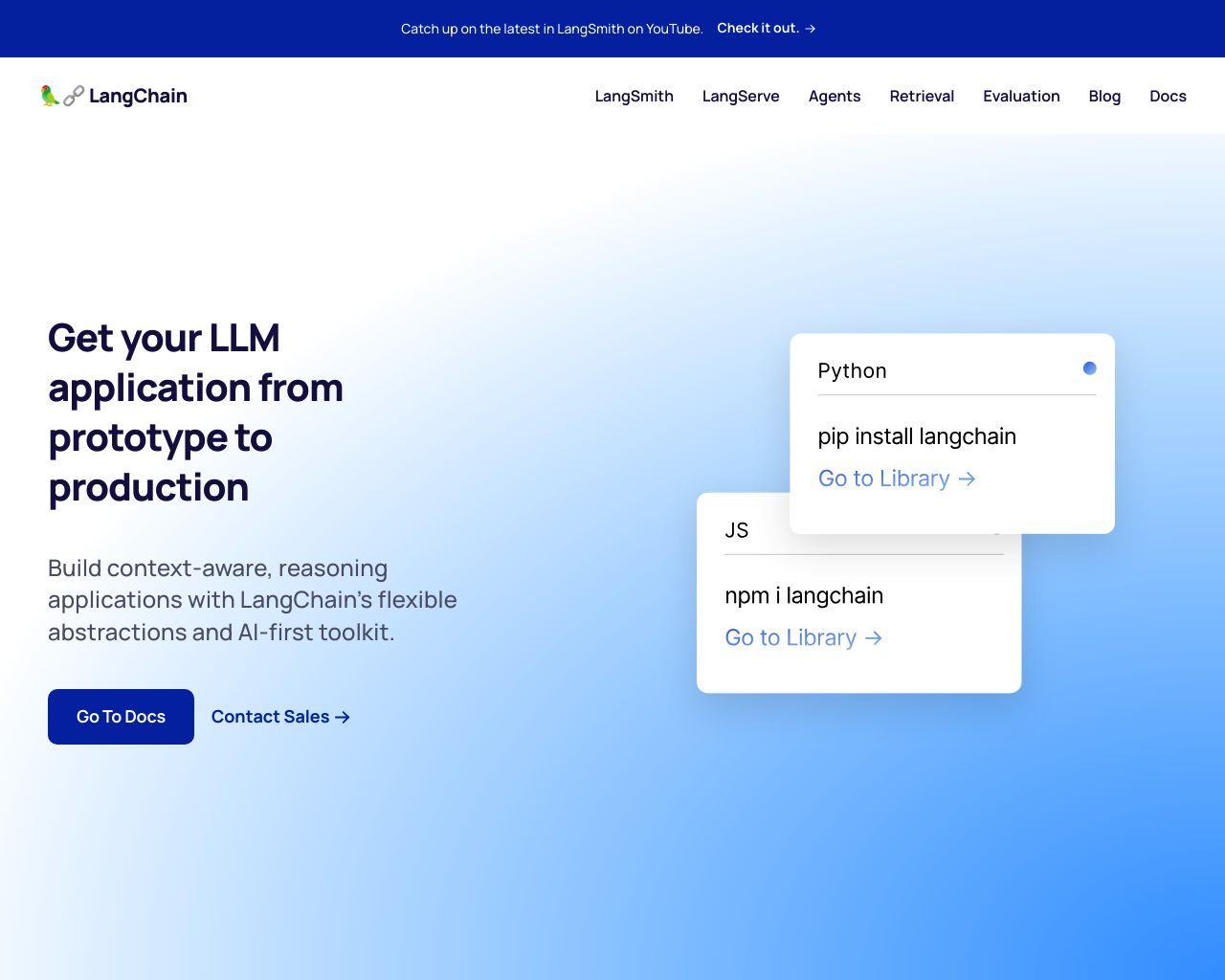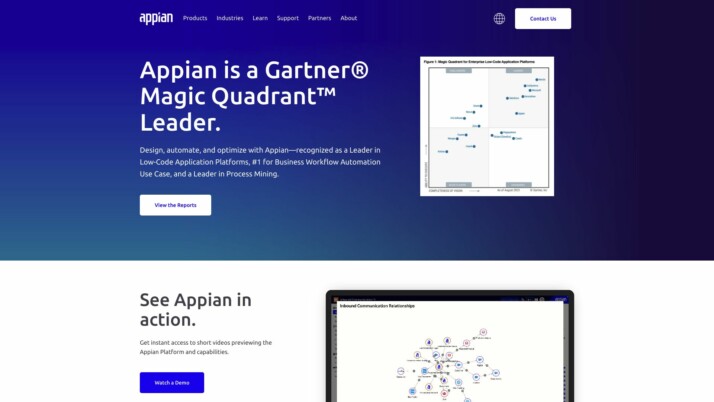LangChain vs. Appian: AI Development Platforms Compared
AI development platforms LangChain vs. Appian offer powerful but distinct approaches for harnessing language models and automating business processes. This comparison explores how each platform empowers different users — from developers building custom AI applications to business teams streamlining workflows.
We’ll examine key features, development approaches, and security considerations to help you determine which solution best fits your organization’s AI needs. We’ll also introduce SmythOS, an emerging platform that combines flexible development tools with enterprise-grade security and ease of use. Whether you’re a seasoned AI engineer or new to automation, this guide will equip you to make an informed decision about these transformative technologies.
LangChain Overview
LangChain empowers developers to build sophisticated applications powered by large language models (LLMs). This open-source framework streamlines the entire LLM application lifecycle, from development to deployment. LangChain’s modular architecture provides building blocks for creating AI agents, chatbots, and other language-driven tools.
At its core, LangChain offers a suite of components for working with LLMs. These include prompt templates, output parsers, and memory systems for maintaining context. The framework also supports integration with various data sources and external tools, enabling developers to create AI applications that can reason over documents, interact with APIs, and perform complex multi-step tasks.
LangChain empowers developers to build sophisticated applications powered by large language models (LLMs). This open-source framework streamlines the entire LLM application lifecycle, from development to deployment.
LangChain distinguishes itself through its comprehensive ecosystem. LangGraph allows developers to build stateful, multi-actor applications. LangSmith provides powerful tools for debugging, testing, and monitoring LLM applications. For deployment, LangServe enables easy conversion of LangChain applications into production-ready APIs.


While LangChain offers tremendous flexibility, its open-source nature means that users must invest time in learning the framework and managing their own infrastructure. The platform excels at empowering developers but may present a steeper learning curve for non-technical users seeking no-code solutions. Additionally, as an open-source project, enterprise-grade support options may be limited compared to some commercial alternatives.
LangChain’s position in the AI development landscape is strong, particularly for teams seeking fine-grained control over their LLM applications. Its active community and extensive documentation make it a compelling choice for developers willing to invest in mastering a powerful, customizable framework for AI application development.
Appian Overview
Appian transforms business processes through its innovative low-code AI platform. The software empowers organizations to integrate artificial intelligence seamlessly into their workflows, enhancing efficiency and decision-making across various industries.


Appian’s platform stands out for its ability to democratize AI development. Through a user-friendly low-code environment, both technical experts and business professionals can create sophisticated AI models without extensive data science knowledge. This approach accelerates AI adoption and allows companies to rapidly deploy intelligent solutions tailored to their specific needs.
Appian’s platform stands out for its ability to democratize AI development… both technical experts and business professionals can create sophisticated AI models without extensive data science knowledge.
The software boasts an array of pre-built AI capabilities, including document classification, data extraction, and email sorting. Appian also integrates cutting-edge generative AI features, enabling tasks like prompt building, text summarization, and PII detection. These tools empower businesses to automate complex processes and enhance customer interactions with minimal coding effort.
Appian prioritizes data security and privacy, a critical concern for enterprises handling sensitive information. The platform ensures that AI models and associated data remain under the user’s control, addressing compliance requirements across various industries. This commitment to data protection, combined with the software’s robust automation tools, positions Appian as a comprehensive solution for organizations seeking to leverage AI while maintaining stringent security standards.
While Appian excels in many areas, potential users should consider its learning curve and the depth of customization required for complex use cases. The platform’s strength lies in its ability to streamline AI integration for common business processes, but highly specialized applications may require additional development effort. Nonetheless, Appian’s continuous innovation and focus on user-friendly AI deployment make it a compelling option for businesses looking to harness the power of artificial intelligence in their operations.
Feature Comparison
LangChain and Appian offer distinct approaches to AI development and deployment. LangChain provides an open-source framework for building applications powered by large language models, while Appian focuses on low-code AI integration for business process automation.
In terms of core components, LangChain excels with its comprehensive ecosystem for LLM application development. It offers LangGraph for creating stateful, multi-actor applications and LangSmith for debugging, testing, and monitoring. Appian, on the other hand, provides pre-built AI capabilities like document classification and extraction, emphasizing ease of use for business users through its low-code platform.
Security features highlight a key difference between the two. Appian prioritizes data privacy and security, ensuring AI models and data remain under the user’s control within their infrastructure. This makes Appian particularly appealing for enterprises with strict compliance requirements. LangChain, while supporting best practices, does not offer the same level of built-in enterprise-grade security features, potentially requiring additional configuration for sensitive deployments.
We’ve designed SmythOS to combine the strengths of both approaches while addressing their limitations. Our platform offers the flexibility and power of LangChain’s framework with the user-friendliness and security focus of Appian. SmythOS provides a visual builder for creating sophisticated AI agents, robust security features including data encryption and OAuth, and seamless deployment options across various environments. By bridging the gap between developer-centric and business-user-friendly tools, SmythOS empowers organizations to leverage AI more effectively and securely than either LangChain or Appian alone.
Feature Comparison Table
| LangChain | Appian | SmythOS | |
|---|---|---|---|
| CORE FEATURES | |||
| Hosted Agents (Dev, Production) | ✅ | ❌ | ✅ |
| Visual Builder | ❌ | ✅ | ✅ |
| No-Code Options | ❌ | ✅ | ✅ |
| Autonomous Agents | ✅ | ❌ | ✅ |
| Multi-Agent Collaboration | ✅ | ❌ | ✅ |
| Agent Work Scheduler | ❌ | ❌ | ✅ |
| SECURITY | |||
| Constrained Alignment | ❌ | ✅ | ✅ |
| IP Control | ❌ | ✅ | ✅ |
| COMPONENTS | |||
| Foundation AIs | ✅ | ❌ | ✅ |
| Huggingface AIs | ✅ | ❌ | ✅ |
| Zapier APIs | ❌ | ❌ | ✅ |
| Data Lakes | ❌ | ✅ | ✅ |
| DEPLOYMENT OPTIONS (EMBODIMENTS) | |||
| Deploy as Webhook | ❌ | ✅ | ✅ |
| Staging Domains | ❌ | ✅ | ✅ |
| Production Domains | ❌ | ✅ | ✅ |
| Deploy as Site Chat | ✅ | ❌ | ✅ |
| Deploy as Scheduled Agent | ❌ | ❌ | ✅ |
| Deploy as GPT | ✅ | ❌ | ✅ |
| DATA LAKE SUPPORT | |||
| Hosted Vector Database | ❌ | ❌ | ✅ |
| Sitemap Crawler | ❌ | ❌ | ✅ |
| YouTube Transcript Crawler | ❌ | ❌ | ✅ |
| URL Crawler | ❌ | ❌ | ✅ |
| Word File Support | ❌ | ✅ | ✅ |
Best Alternative to LangChain and Appian
SmythOS stands out as the superior alternative to LangChain and Appian for agentic AI automation. Our platform combines the flexibility of LangChain’s framework with the user-friendliness of Appian’s low-code approach, while addressing their limitations.
We’ve designed SmythOS to empower users with a visual builder for creating sophisticated AI agents without sacrificing advanced capabilities. Unlike LangChain’s developer-centric approach or Appian’s limited AI integration, SmythOS offers a comprehensive solution that caters to both technical and non-technical users.
Our platform excels in ease of use, featuring a drag-and-drop interface that simplifies complex AI workflow creation. This visual approach allows users to build and deploy AI agents 99% faster than traditional methods…
Our platform excels in ease of use, featuring a drag-and-drop interface that simplifies complex AI workflow creation. This visual approach allows users to build and deploy AI agents 99% faster than traditional methods, democratizing AI development across organizations.
SmythOS boasts an unmatched feature set that surpasses both LangChain and Appian. We offer autonomous agents, multi-agent collaboration, and an agent work scheduler—capabilities not found in Appian and only partially available in LangChain. Our platform also provides robust security features, including data encryption and OAuth integration, addressing enterprise-grade security concerns that LangChain lacks.
Unlike LangChain’s open-source framework or Appian’s limited AI capabilities, SmythOS supports unlimited use cases. From deploying AI agents as APIs and webhooks to integrating with popular services like Zapier…
Unlike LangChain’s open-source framework or Appian’s limited AI capabilities, SmythOS supports unlimited use cases. From deploying AI agents as APIs and webhooks to integrating with popular services like Zapier, our platform offers unparalleled versatility. We’ve also included advanced features like a hosted vector database and support for various data types, enabling users to tackle complex AI projects with ease.
By choosing SmythOS, organizations gain a powerful, secure, and user-friendly platform that combines the best aspects of LangChain and Appian while offering unique advantages. Our solution empowers businesses to harness the full potential of AI, driving innovation and efficiency across industries.
Conclusion
LangChain and Appian each offer unique strengths in AI development and deployment. LangChain provides a powerful open-source framework for building sophisticated LLM applications, while Appian excels in low-code AI integration for business process automation. Both platforms have their merits, but also come with limitations that may impact certain use cases.
SmythOS emerges as a compelling alternative, combining the best aspects of both platforms while addressing their shortcomings. Our platform offers the flexibility and power of LangChain’s framework with the user-friendliness of Appian’s low-code approach. We provide a visual builder for creating sophisticated AI agents, robust security features, and seamless deployment options across various environments.
What sets SmythOS apart is its comprehensive ecosystem of over 300,000 integrations, allowing users to orchestrate complex workflows with ease. Our “Create Once, Deploy Anywhere” approach enables the deployment of AI agents across multiple platforms and services, from chatbots to APIs and scheduled tasks. This versatility, combined with our commitment to security and scalability, makes SmythOS an ideal choice for businesses looking to harness the full potential of AI.
We invite you to experience the power of SmythOS for yourself. Explore our diverse range of AI-powered agent templates to jumpstart your projects, or create a free SmythOS account to build unlimited AI agents at no cost. With our 30-day money-back guarantee, you can discover the future of workforce automation risk-free. Take the first step towards revolutionizing your AI workflow today with SmythOS.
Last updated:
Disclaimer: The information presented in this article is for general informational purposes only and is provided as is. While we strive to keep the content up-to-date and accurate, we make no representations or warranties of any kind, express or implied, about the completeness, accuracy, reliability, suitability, or availability of the information contained in this article.
Any reliance you place on such information is strictly at your own risk. We reserve the right to make additions, deletions, or modifications to the contents of this article at any time without prior notice.
In no event will we be liable for any loss or damage including without limitation, indirect or consequential loss or damage, or any loss or damage whatsoever arising from loss of data, profits, or any other loss not specified herein arising out of, or in connection with, the use of this article.
Despite our best efforts, this article may contain oversights, errors, or omissions. If you notice any inaccuracies or have concerns about the content, please report them through our content feedback form. Your input helps us maintain the quality and reliability of our information.
